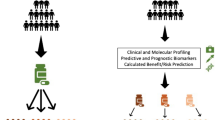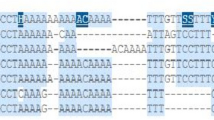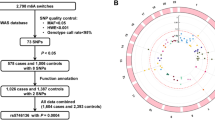Abstract
Background
Common single-nucleotide polymorphisms (SNPs) in microRNAs (miRNA) have been shown to be associated with susceptibility to several human diseases. We evaluated the associations of three SNPs (rs11614913, rs2910164, and rs3746444) in pre-miRNAs (miR-196a2, miR-146a, and miR-499) with the risk of ulcerative colitis (UC) in a Japanese population.
Methods
The rs11614913 (T > C), rs2910164 (C > G), and rs3746444 (A > G) SNPs were genotyped in 170 UC and 403 control subjects.
Results
The rs3746444 AG genotype was significantly higher among the UC group (odds ratio (OR) = 1.51, 95% CI = 1.03–2.21, p = 0.037). The rs3746444 AG genotype was associated with onset at an older age (OR = 1.70, 95% CI = 1.04–2.78, p = 0.035), left-sided colitis and pancolitis (left-sided colitis, OR = 2.10, 95% CI = 1.12–3.94, p = 0.024; pancolitis, OR = 1.81, 95% CI = 1.09–3.01, p = 0.028, left-sided colitis + pancolitis, OR = 1.91, 95% CI = 1.26–2.92, p = 0.003), higher number of times hospitalized (OR = 2.63, 95% CI = 1.22–5.69, p = 0.017), steroid dependence (OR = 2.63, 95% CI = 1.27–5.44, p = 0.014), and refractory phenotypes (OR = 2.76, 95% CI = 1.46–5.21, p = 0.002) while the rs3746444 AA genotype was inversely associated with the number of times hospitalized (2∼, OR = 0.36, 95% CI = 0.17–0.79, p = 0.012), steroid dependence (OR = 0.42, 95% CI = 0.21–0.88, p = 0.021), and refractory phenotypes (OR = 0.38, 95% CI = 0.20–0.72, p = 0.003). The rs1161913 TT genotype also held a significantly higher risk of refractory phenotype (T/T vs. T/C + C/C, OR = 2.21, 95% CI = 1.17–4.18, p = 0.016).
Conclusions
Our results provided the first evidence that rs3746444 SNP may influence the susceptibility to UC, and both rs3746444 and rs11614913 SNPs may influence the pathophysiological features of UC.
Similar content being viewed by others
Abbreviations
- UC:
-
Ulcerative colitis
- miRNA:
-
MicroRNAs
- PCR:
-
Polymerase chain reaction
- RFLP:
-
Restricted fragment length polymorphism
References
Head KA, Jurenka JS. Inflammatory bowel disease part I: ulcerative colitis-pathophysiology and conventional and alternative treatment options. Altern Med Rev. 2003;8:247–83.
Lakatos L, Lakatos PL. Etiopathogenesis of inflammatory bowel diseases. Orv Hetil. 2003;144:1853–60.
Hugot JP. Inflammatory bowel disease: causes and consequences. Best Pract Res Clin Gastroenterol. 2004;18:447–9.
Schwab M, Schaeffeler E, Marx C, Fromm MF, Kaskas B, Metzler J, et al. Association between the C3435T MDR1 gene polymorphism and susceptibility for ulcerative colitis. Gastroenterology. 2003;124:26–33.
Brant SR, Panhuysen CI, Nicolae D, Reddy DM, Bonen DK, Karaliukas R, et al. MDR1 Ala893 polymorphism is associated with inflammatory bowel disease. Am J Hum Genet. 2003;73:1282–92.
Franke A, Hampe J, Rosenstiel P, Becker C, Wagner F, Häsler R, et al. Systematic association mapping identifies NELL1 as a novel IBD disease gene. PLoS ONE. 2007;2:e691.
Fisher SA, Tremelling M, Anderson CA, et al. Genetic determinants of ulcerative colitis include the ECM1 locus and five loci implicated in Crohn’s disease. Nat Genet. 2008;40:710–12.
Franke A, Balschun T, Karlsen TH, Hedderich J, May S, Lu T, et al. Replication of signals from recent studies of Crohn’s disease identifies previously unknown disease loci for ulcerative colitis. Nat Genet. 2008;40:713–15.
Lagos-Quintana M, Rauhut R, Lendeckel W, Tuschl T. Identification of novel genes coding for small expressed RNAs. Science. 2001;294:853–8.
Lau NC, Lim LP, Weinstein EG, Bartel DP. An abundant class of tiny RNAs with probable regulatory roles in Caenorhabditis elegans. Science. 2001;294:858–62.
Lee RC, Ambros V. An extensive class of small RNAs in Caenorhabditis elegans. Science. 2001;294:862–4.
Ambros V. MicroRNA pathways in flies and worms: growth, death, fat, stress, and timing. Cell. 2003;113:673–6.
Wu F, Zikusoka M, Trindade A, Dassopoulos T, Harris ML, Bayless TM, et al. MicroRNAs are differentially expressed in ulcerative colitis and alter expression of macrophage inflammatory peptide-2 alpha. Gastroenterology. 2008;135:1624–35.
Hu Z, Chen J, Tian T, Zhou X, Gu H, Xu L, et al. Genetic variants of miRNA sequences and non-small cell lung cancer survival. J Clin Invest. 2008;118:2600–8.
Tian T, Shu Y, Chen J, Hu Z, Xu L, Jin G, et al. A functional genetic variant in microRNA-196a2 is associated with increased susceptibility of lung cancer in Chinese. Cancer Epidemiol Biomarkers Prev. 2009;18:1183–87.
Jazdzewski K, Murray EL, Franssila K, Jarzab B, Schoenberg DR, de la Chapelle A. Common SNP in pre-miR-146a decreases mature miR expression and predisposes to papillary thyroid carcinoma. Proc Natl Acad Sci U S A. 2008;105:7269–74.
Xu T, Zhu Y, Wei QK, Yuan Y, Zhou F, Ge YY, et al. A functional polymorphism in the miR-146a gene is associated with the risk for hepatocellular carcinoma. Carcinogenesis. 2008;29:2126–31.
Hu Z, Liang J, Wang Z, Tian T, Zhou X, Chen J, et al. Common genetic variants in premicroRNAs were associated with increased risk of breast cancer in Chinese women. Hum Mutat. 2009;30:79–84.
Xu J, Hu Z, Xu Z, Gu H, Yi L, Cao H, et al. Functional variant in microRNA-196a2 contributes to the susceptibility of congenital heart disease in a Chinese population. Hum Mutat. 2009;30:1231–6.
Podolsky DK. Inflammatory bowel disease 2. N Engl J Med. 1991;325:928–37.
O’Connell RM, Taganov KD, Boldin MP, Cheng G, Baltimore D. MicroRNA-155 is induced during the macrophage inflammatory response. Proc Natl Acad Sci U S A. 2007;104:1604–9.
Taganov KD, Boldin MP, Chang KJ, Baltimore D. NF-kappaB-dependent induction of microRNA miR-146, an inhibitor targeted to signaling proteins of innate immune responses. Proc Natl Acad Sci U S A. 2006;15;103:12481–6.
Hugot JP, Thomas G. Genome-wide scanning in inflammatory bowel diseases. Dig Dis. 1998;6:364–9.
Author information
Authors and Affiliations
Corresponding author
Rights and permissions
About this article
Cite this article
Okubo, M., Tahara, T., Shibata, T. et al. Association Study of Common Genetic Variants in Pre-microRNAs in Patients with Ulcerative Colitis. J Clin Immunol 31, 69–73 (2011). https://doi.org/10.1007/s10875-010-9461-y
Received:
Accepted:
Published:
Issue Date:
DOI: https://doi.org/10.1007/s10875-010-9461-y




